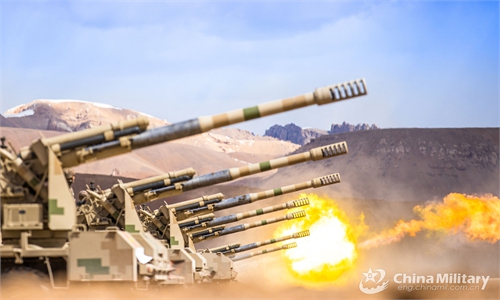Taiwan authorities abandon US anti-sub helicopters sale due to 'high price,' sparking speculation over discord and divergence

A view of the Taipei city, Taiwan island Photo: Unsplash
About a week after US cancelled its first arms deal to Taiwan authorities under the Biden administration, the island announced to abandon the plan to buy anti-submarine warfare helicopter from the US as "the price is too high." The seemingly-surprising snub attracted observer speculation that the secessionists Democratic Progressive Party is somehow at odds with Biden administration due to the divergence in interests.
Chinese experts said on Friday that Taiwan's noncompliance could make the US feel the need to put more pressure on it to comply with Washington's plan. And pathetically, Taiwan would have to pay a higher price for the US weapons even if they have realized that the US security promise is simply empty words.
When being asked about the island's purchase of US arms, Chiu Kuo-cheng, the Taiwan authorities' defense leader, said on Thursday that the 12 MH-60R anti-submarine helicopters is too expensive, "beyond the scope of our capability."
It was the third arms deals between the US and Taiwan to be cancelled or postponed since May. The first deal approved by the Biden administration to sell $750 million worth of arms to Taiwan, including 40 155mm M109A6 medium self-propelled howitzers, has been halted by the US. The delivery of the mobile Stinger anti-aircraft missiles was also announced delayed because of "demand from Ukraine," Taiwan media outlets reported.
Despite the US explaining the halt as shift of plan to meet "actual operational needs," experts said it's more like a discord, especially regarding that the island's defense authority made clear in April that it will not buy Apache helicopter, retired warships and Black Hawk helicopters from the US.
The US has already sent warning signals to Taiwan authorities that arms sales should be guided by US requirements and that Taiwan needs to be cooperative, Diao Daming, associate professor at the Renmin University of China in Beijing, told the Global Times on Friday.
Meanwhile, Diao does not expect the discord in arm sales to result in a substantial policy shift when it comes to US-Taiwan island arms deals, "the Taiwan authorities are buying weapons from the US in order to more closely bind US domestic interests… In the context of China-US strategic competition, the US also needs to play the Taiwan card."
Despite that the US Secretary of State Antony Blinken's recent remarks that the Biden administration was determined to make sure that Taiwan authorities "have all necessary means to defend itself," Diao said the recent discord means the mainland has a chance to take the initiative.
Taiwan had indeed become significantly less willing to pick up the tab for the US. Taiwan media reported during the US congressmen delegation visit to the island in April, US Senator Lindsey Graham publicly asked Taiwan's "China Airline" to purchase 24 Boeing 787s in the talk with the island's regional leader Tsai Ing-wen. However, videos online showed that the translator did not translate Graham's words, but instead said both sides look forward to good results from the cooperation.
It is possible that Taiwan is really not able to afford the US anti-submarine helicopters, but that won't stop US stepping up efforts to sell weapons into Taiwan, Chinese military expert Song Zhongping said.
Song told the Global Times that the US sells Taiwan authorities weapons at a far higher price than it sells to other allies, and none of it is advanced equipment, and that some the of the hardware sold may be viewed as scrap metal in the eyes of the People's Liberation Army.
"As can be seen from the Ukraine crisis, the so-called US military assistance is limited to the arm sales. Secessionists need to figure out what 'America first' means to Taiwan," Song said.
"The US does not sell the weapons that Taiwan wants to buy, and Taiwan does not want to buy the weapons US offered…This asymmetry is just like Taiwan knows that the US commitment is questionable, but has to use the US as a last resort," Song noted.


